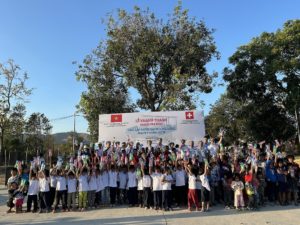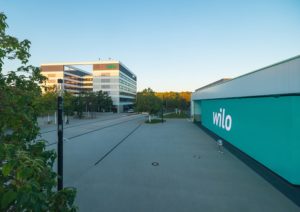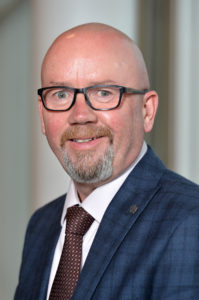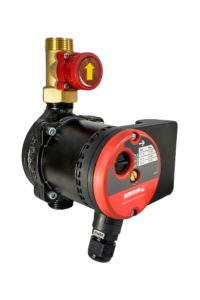Sulzer Returns to Organic Order Growth
In 2017, order intake grew by 2% organically and 12% including acquisitions. Sales increased by 5% on acquisitions but declined organically because of a low order backlog entering the year.
Despite lower organic sales volumes and a CHF 10 million one-off charge linked to a discontinued activity, operational profitability rebounded slightly. The positive impact of the Sulzer Full Potential (SFP) program more than compensated for continuing market headwinds. The program will be extended by a year and the total savings target increased to CHF 230 million. Sulzer will propose an unchanged ordinary dividend of CHF 3.50 at the Annual General Meeting.
Encouraging organic order growth and strong contribution from acquisitions
Order intake increased by 11.8% (nominal 12.8%), with 2.2% coming from organic growth and the rest (CHF 269.1 million) from acquisitions. Order intake gross margin increased nominally by 0.4 percentage points to 34.4% as business mix effects more than offset the margin erosion from price pressure in the energy markets.
Order intake in the Pumps Equipment division increased by 8.1%, with 6.6% coming from the acquisition of Ensival Moret and 1.5% from organic growth. Organic growth was driven by oil and gas and general industry orders, which compensated for a sharp organic decline in power orders. Orders in the water market remained broadly flat on fewer large infrastructure projects, while municipal water order intake grew by 3%. In the Rotating Equipment Services division, order intake grew by 4.9% as a result of the Rotec acquisition. Orders decreased organically by 0.9%, which compared well against the broader market. This was mainly due to lower orders in the turbo services segment in a weak and highly competitive power market. Order intake in the Chemtech division grew by 5.9% (organically 5.1%) supported by the rebound of the Chinese market and strong growth in Europe. In the Applicator Systems division, orders increased by 55.7%, with 6.0% coming from organic growth and the rest from the acquisitions of Geka, PC Cox, and Transcodent. Overall, Sulzer order intake grew in all regions, except the Middle East and Africa.
Higher sales due to acquisitions – operational return on sales increased slightly
Sales amounted to CHF 3’049.0 million – an increase of 5.2% (nominal: 6.0%). This rise was driven by CHF 276.4 million of acquisition-related sales, which offset an organic sales decline of 4.4%. The organic decline resulted from a low order backlog entering the year. Positive currency translation effects totaled CHF 23.8 million.
Operational EBITA (opEBITA) amounted to CHF 255.4 million compared with CHF 238.9 million in 2016, an increase of 5.3% (nominal 6.9%). Savings of CHF 61 million from the SFP program and the contribution of acquisitions more than offset the impact of headwinds and a CHF 10 million one-off charge in the Chemtech division for a discontinued business activity. OpEBITA decreased organically by 2.9% from 2016.
Higher net income
As part of the SFP program, Sulzer has continued to adapt its global manufacturing capacities and streamlined its organization. Restructuring expenses significantly decreased from 2016. Consequently, EBIT amounted to CHF 136.5 million compared with CHF 115.3 million in 2016. Return on sales (ROS) was 4.5% compared with 4.0% in 2016.
In 2017, net income amounted to CHF 87.2 million compared with CHF 60.1 million in the previous year. Core net income excluding the tax-adjusted effects of non-operational items totaled CHF 178.3 million compared with CHF 153.8 million in 2016. Basic earnings per share increased from CHF 1.73 in 2016 to CHF 2.44 in 2017.
Solid free cash flow
Free cash flow amounted to CHF 127.0 million compared with the CHF 200.5 million reported in the prior year. The decline was mainly due to higher cash-out for restructuring and lower contribution from net working capital improvements. The lower contribution from net working capital came from higher inventories on strong 2017 order growth, while inventory levels had decreased in 2016.
Outlook 2018
Sulzer expects that the oil and gas market, which accounts for approximately 40% of its sales, will gradually recover and translate into a commercial rebound mostly visible in 2019. The power market is expected to decline, while all other Sulzer markets are forecasted to continue on their current growth path in 2018. This should lead to a slight increase in organic order level for the company, supplemented by additional volume from newly acquired businesses.
Sulzer has delivered to-date cumulative SFP savings of CHF 185 million, ahead of the previously communicated range of CHF 160 to 180 million. Sulzer decided to extend its SFP program by an additional year. The company is therefore raising its cumulative savings target from the previously communicated CHF 200 million (from 2018 onwards) to CHF 230 million (from 2019 onwards). In 2018, Sulzer expects its SFP program to deliver incremental cost savings of approximately CHF 25 million to cumulatively reach CHF 210 million.
For the full year 2018, including acquisitions signed in 2017 and adjusted for currency effects, order intake is expected to grow by 5 to 7% and sales to grow by 4 to 6%. Sulzer expects opEBITA margin at around 9.5% (opEBITA in percent of sales).
Management changes
As previously announced, Thomas Dittrich will step down as CFO and be replaced by current Board member and member of the Audit Committee Jill Lee on April 5, 2018. Thomas will depart Sulzer on March 18, 2018. The Board of Directors has appointed Sulzer’s CEO Greg Poux-Guillaume ad interim CFO for the transition period, in addition to his existing duties.
Proposals by the Board of Directors at the Annual General Meeting
The Board of Directors will propose an unchanged ordinary dividend of CHF 3.50 per share (2016: CHF 3.50) at the Annual General Meeting on April 4, 2018. This represents a 3% dividend yield.
The Board of Directors will also propose Peter Löscher, Matthias Bichsel, Axel C. Heitmann, Mikhail Lifshitz, Marco Musetti and Gerhard Roiss all be reelected for a one-year term of office at the Sulzer Annual General Meeting.
Furthermore, Thomas Glanzmann has decided to retire from the Board of Directors after 6 terms in office and Jill Lee will become CFO and will not stand for reelection. The Board of Directors will propose the election of Hanne Birgitte Breinbjerg Sørensen and Lukas Braunschweiler to the Board.
Divisional results in detail
Pumps Equipment
In 2017, the Pumps Equipment division reported growing order intake on a currency-adjusted basis (8.1%) and organically (1.5%) compared with the previous year. The organic increase was largely triggered by the improved oil and gas market. Orders in the water market remained flat on fewer large orders for the engineered water business in 2017, despite 3% organic growth in Municipal Water. Order intake in the power market decreased due to project delays in a highly competitive market. Order intake in the general industry markets grew organically and was supplemented by the Ensival Moret acquisition.
Regionally, Europe, the Middle East, and Africa grew on a currency-adjusted basis but decreased organically. Demand in the Americas and Asia-Pacific regions grew significantly.
Compared with 2016, sales decreased on a currency-adjusted basis (–4.3%) and organically (–12.9%). This was largely due to the significantly lower sales volumes from the energy markets on a lower order backlog at the beginning of 2017.
Operational EBITA decreased, impacted by lower organic sales volumes and the Ensival Moret acquisition, which we had announced would be dilutive in 2017. The slightly negative operational EBITA resulted in an operational ROSA of –0.3%.
Rotating Equipment Services
In 2017, order intake increased on a currency-adjusted basis (4.9%) and remained broadly stable organically (–0.9%), which compared well against the broader market.
Regionally, the Americas and Asia-Pacific grew. Europe, the Middle East, and Africa also increased on a currency-adjusted basis but decreased organically. The organic decline was due to lower orders in the turbo services business, impacted by a challenging market environment for gas turbines.
Rotating Equipment Services reported an increase in sales on a currency-adjusted basis (1.6%) and an organic sales decrease (–2.1%) compared with 2016. Lower volumes in the oil and gas as well as in the power markets drove the decline.
Operational EBITA increased on a currency-adjusted basis (2.4%) and decreased organically (–1.8%). Despite pricing pressure, operational ROSA increased to 13.9%.
Chemtech
In 2017, order intake increased by 5.9% on a currency-adjusted basis and by 5.1% organically, driven by the rebound of the downstream market and the chemical processing industry, mainly in China. Growth was also supported by the introduction of new technologies. Order intake in the Separation Technology business unit was strong, especially for installations in the Asia-Pacific region. Order intake in the Tower Field Service business unit remained on last year’s level.
Regionally, Europe and Asia-Pacific grew strongly. The Middle East and the Americas remained flat. Africa declined from a high base caused by one big project in the previous year.
In 2017, Chemtech reported growing sales, both on a currency-adjusted basis (7.0%) and organically (6.2%). The increase mostly stemmed from the positive development in the oil and gas market.
Operational EBITA increased strongly on a currency-adjusted basis (35.2%) and organically (39.7%). A higher sales volume and operational improvement measures triggered the increase. Accordingly, operational ROSA increased significantly to 7.3% before a CHF 10 million one-time charge for a discontinued business activity in Tower Field Services.
Applicator Systems
In 2017, orders increased on a currency-adjusted basis (55.7%) and organically (6.0%) compared with 2016. Sales, which track orders closely in this division, increased by 54.9% and organically by 5.0%. The acquisitions of PC Cox, Geka, and Transcodent contributed CHF 135.8 million to sales in 2017. All product lines, particularly the industrial adhesives segment, and geographies contributed to growth.
In 2017, operational EBITA increased significantly, both on a currency-adjusted basis (34.8%) and organically (10.3%). Operational ROSA, while diluted by the Geka acquisition, which closed in the third quarter of 2016, actually increased on a comparable basis from pro forma 20.1% in 2016 to 20.5% in 2017.







